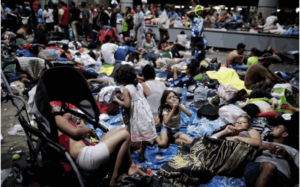Key Witness Drops Bombshell in Uribe’s Trial 2
Key Witness Testifies in Trial of Alvaro Uribe, Colombia’s Former President
Alright folks, so here’s the scoop. Alvaro Uribe, Colombia’s former president, is in hot water. This trial is the talk of the town, and it’s all about some serious witness tampering allegations. The courtroom drama took a wild turn when a key witness dropped some unexpected revelations. It’s not just about Uribe’s defense anymore; this has got everyone buzzing, from legal experts to the man on the street. Let’s dive into what this all means for Uribe and Colombia.
Key Takeaways
- A key witness in Uribe’s trial revealed unexpected information, shaking up the courtroom dynamics.
- Uribe, Colombia’s ex-president, faces serious charges of witness tampering and bribery.
- The chief prosecutor accuses Uribe of abusing his status to influence witnesses.
- Public opinion is divided, with some supporting Uribe and others demanding justice.
- The trial could have long-term effects on Colombia’s political and judicial landscape.
Key Witness Testifies in Uribe’s Trial
Unexpected Revelations in Court
In a dramatic turn of events, Juan Guillermo Monsalve, the main witness for the prosecution, took the stand in the trial of former Colombian President Álvaro Uribe. Monsalve’s testimony was nothing short of explosive, as he detailed alleged attempts by Uribe to manipulate witness statements. According to Monsalve, there were concerted efforts to sway testimonies in favor of Uribe, which could significantly alter the course of this high-profile case.
Impact on Uribe’s Defense Strategy
Uribe’s legal team now faces a daunting challenge. With Monsalve’s unexpected revelations, they must reassess their approach. The defense had initially planned to discredit Monsalve, but his detailed account has forced them to rethink their strategy:
- Re-evaluate Witness Testimonies: The defense needs to scrutinize all witness statements to identify any inconsistencies.
- Strengthen Legal Arguments: They must bolster their legal arguments to counter the new allegations.
- Public Relations Campaign: Managing public perception has become crucial as the trial unfolds.
Public Reaction to Testimony
The public’s response to Monsalve’s testimony has been mixed. While some view it as a pivotal moment in holding Uribe accountable, others see it as a politically motivated attack. The streets of Bogotá have been filled with both supporters and critics of Uribe, each voicing their opinions loudly.
The trial of Álvaro Uribe is more than just a legal battle; it’s a reflection of Colombia’s ongoing struggle with its past and its future. The outcome could have lasting implications for the country’s political and judicial landscape.
Alvaro Uribe Faces Serious Charges

Details of the Witness Tampering Allegations
Alvaro Uribe, Colombia’s former president, has found himself in a legal quagmire. He’s been charged with witness tampering and bribery, tied to efforts to undermine a political adversary. This all started back in 2012 when Uribe accused Iván Cepeda, a leftist lawmaker, of bribing jailed paramilitary leaders to testify against him. However, things took a twist when the Supreme Court, instead of indicting Cepeda, decided to investigate Uribe himself for these very charges. If found guilty, Uribe could face up to 12 years behind bars.
Potential Consequences for Colombia’s Former President
The implications of these charges for Uribe are serious. Being a former president, the stakes are high. A conviction would not only lead to prison time but also tarnish his political legacy. The charges have already led to Uribe being placed under house arrest at one point, and the legal battle continues to drag on. This case has stirred significant political and public interest, given Uribe’s influential role in Colombian politics.
Legal Experts Weigh In on the Case
Legal experts have been vocal about the complexities of Uribe’s case. Many point out that the case is not just about legalities but also about the broader political implications. Some experts suggest that the case might set a precedent for how former leaders are held accountable in Colombia. The legal proceedings have been closely watched, with opinions divided on whether Uribe should be prosecuted or if the charges are politically motivated.
The trial of a former president like Uribe is unprecedented in Colombia, making it a landmark case that could reshape the country’s judicial landscape.
The Role of the Chief Prosecutor
Gilberto Ivan Villareal’s Strategy
The role of the Chief Prosecutor, Gilberto Ivan Villareal, in Alvaro Uribe’s trial is under intense scrutiny. Villareal’s strategy seems to be a balancing act between pursuing justice and managing political pressures. His approach has been criticized for appearing too lenient towards Uribe, possibly due to Uribe’s significant influence in Colombian politics. Villareal’s team is tasked with presenting a solid case, yet they face the challenge of ensuring that their actions are perceived as impartial and fair.
Challenges in Proving the Case
Proving the allegations against Uribe is no small feat. The prosecution must navigate a complex web of political alliances and historical biases that could affect the trial’s outcome. The main challenge lies in gathering credible evidence that can withstand scrutiny from both the defense and the public. A successful prosecution would require airtight witness testimonies and documents that clearly demonstrate Uribe’s involvement in the alleged crimes.
Reactions from the Legal Community
The legal community is divided over Villareal’s handling of the case. Some legal experts argue that the prosecution is not doing enough to hold Uribe accountable, while others believe that the case is being pursued with due diligence. This division reflects broader societal tensions over the trial and its implications for Colombia’s justice system. The outcome of the trial could set a precedent for how high-profile political cases are handled in the future.
The Chief Prosecutor’s role is pivotal in navigating the legal and political intricacies of this high-stakes trial, which could redefine the boundaries of justice in Colombia.
Historical Context of the Trial
Uribe’s Political Background
Alvaro Uribe, the former president of Colombia, is a towering figure in the country’s political landscape. His tenure from 2002 to 2010 was marked by a hardline stance against guerrilla groups and a focus on security. Uribe’s policies significantly reduced violence and improved security in Colombia, earning him both praise and criticism. However, his administration was also marred by allegations of human rights abuses and connections to paramilitary groups.
Previous Allegations and Investigations
Uribe’s political career has not been without controversy. Over the years, he has faced various allegations, including accusations of witness tampering and bribery. These allegations stem from a 2012 libel suit he filed against Cepeda, which led to an investigation by the Supreme Court. The case has been a focal point in discussions about Uribe’s influence and the broader implications for Colombia’s judicial system.
The Influence of Paramilitary Groups
Paramilitary groups have played a significant role in Colombia’s recent history, often acting with impunity and influencing political outcomes. During Uribe’s presidency, these groups were both allies and adversaries. While Uribe’s government took steps to demobilize some paramilitary factions, allegations persist that certain elements were allowed to operate with tacit approval. This complex relationship continues to be a point of contention and has influenced public perception of Uribe’s legacy.
The trial of Alvaro Uribe is not just about the former president himself; it is a reflection of Colombia’s ongoing struggle with corruption, justice, and the legacy of paramilitary influence. As the trial unfolds, it brings to light the intricate web of political and social issues that continue to shape the nation.
Public and Political Reactions

Supporters Rally Behind Uribe
In the midst of the trial, Uribe’s loyal supporters have shown up in droves to back him. They’re not just sitting at home; they’re out there, waving banners and chanting slogans. It’s like a scene from a political rally, not a courtroom drama. Many Colombians see Uribe as a hero who fought against guerrilla groups, and they’re sticking by him, come what may. They argue that the charges are politically motivated, a strategy to tarnish his legacy.
Critics Demand Justice
On the flip side, Uribe’s critics are not holding back. They’re calling for justice, insisting that no one should be above the law, not even a former president. These folks are highlighting the seriousness of the witness tampering allegations, pushing for accountability. They see this trial as a chance for Colombia to prove its commitment to justice and transparency.
Impact on Colombia’s Political Landscape
This trial is shaking things up politically. It’s not just about Uribe; it’s about the future of Colombian politics. People are debating whether this could lead to reforms in the justice system or if it’s just another political circus. The trial could redefine how political figures are perceived and held accountable in Colombia. Politicians are watching closely, knowing that the outcome might set a precedent for how power and justice interact in the country.
The trial of Alvaro Uribe is more than just a legal battle; it’s a pivotal moment for Colombia, reflecting the nation’s struggle between upholding justice and navigating political loyalties.
Legal Proceedings and Developments
Timeline of the Trial
The trial of Alvaro Uribe kicked off with a bang, capturing the attention of both local and international media. It all started back in 2020 when the former Colombian president was placed under house arrest. Fast forward to today, and the legal battle is still very much alive. Key dates include the initial arrest, several bail hearings, and the ongoing court sessions that have been anything but predictable. Uribe’s legal team is pulling out all the stops to challenge the charges, making for a drawn-out legal saga.
Key Evidence Presented
In the courtroom, the evidence presented has been a mixed bag. From witness testimonies to phone recordings, the prosecution is building a case that paints a rather grim picture for Uribe. There’s talk of tampered evidence and questionable witness credibility, which only adds layers of complexity to the case. The defense, on the other hand, is keen on discrediting these pieces, arguing that the evidence lacks substance. The tug-of-war over what’s admissible in court is ongoing, and it’s anyone’s guess how it will unfold.
Future Legal Steps
Looking ahead, the trial is far from over. Several legal maneuvers are still on the table, including potential appeals and motions to dismiss certain charges. The defense is expected to push for a dismissal, arguing procedural errors and lack of concrete evidence. Meanwhile, the prosecution is steadfast in its pursuit of justice, aiming to hold Uribe accountable for the alleged crimes. The next few months will be crucial as both sides prepare for what promises to be a relentless legal showdown.
The trial of Alvaro Uribe is not just a legal battle; it’s a test of Colombia’s justice system and its ability to handle high-profile cases with integrity and fairness.
Implications for Colombia’s Justice System
Debate Over Judicial Independence
In Colombia, the debate over judicial independence is more heated than ever. The intertwining of political influence and legal processes has many questioning if true independence is even possible. Judicial independence is crucial for a functioning democracy, yet in Colombia, the lines are blurry. The military justice system, for instance, often handles cases that arguably belong in civilian courts, leading to a perception of impunity. This perception is fueled by the fact that many cases involving human rights abuses remain unresolved or are dealt with leniently.
Potential Reforms in Legal Processes
There’s a growing call for reforms within Colombia’s legal system. Some suggest creating a more transparent and efficient judicial process, especially in handling cases involving public figures. Reforms could include:
- Implementing a clear separation between military and civilian courts.
- Establishing stricter guidelines for handling cases of corruption and human rights violations.
- Encouraging the use of technology to improve transparency and efficiency in legal proceedings.
These steps could help restore public trust and ensure that justice is served fairly and promptly.
Long-term Effects on Political Figures
The ongoing legal battles and trials have significant implications for Colombia’s political landscape. High-profile cases, such as Uribe’s, highlight the vulnerabilities and potential biases within the system. Political figures may find themselves under increased scrutiny, with their actions being closely monitored both domestically and internationally.
The justice system’s handling of these cases will shape public perception and could influence future political careers. If reforms are implemented, they might pave the way for a more accountable and transparent political environment in Colombia.
Final Thoughts
So, here we are at the end of this wild ride. Uribe’s trial has been nothing short of a rollercoaster, with twists and turns that kept everyone on the edge of their seats. The key witness dropping that bombshell was like the cherry on top of this legal drama. It’s clear that the implications of this trial are huge, not just for Uribe, but for the political landscape in Colombia. Whether justice will be served or not, only time will tell. But one thing’s for sure, this case has left a mark, and folks will be talking about it for a long time. Let’s see what the future holds.
Frequently Asked Questions
What is Álvaro Uribe accused of?
Álvaro Uribe is accused of witness tampering and bribery, trying to discredit a political opponent by influencing witnesses.
What could happen to Uribe if he’s found guilty?
If found guilty, Uribe could face up to 12 years in prison for his actions.
Why was Uribe under house arrest?
Uribe was placed under house arrest because of the serious nature of the charges against him, including witness tampering.
Who is Gilberto Ivan Villareal?
Gilberto Ivan Villareal is the chief prosecutor in Uribe’s case, responsible for presenting evidence and arguments against him.
What are the public’s views on Uribe’s trial?
The public is divided; some support Uribe, believing in his innocence, while others demand justice and accountability.














Post Comment